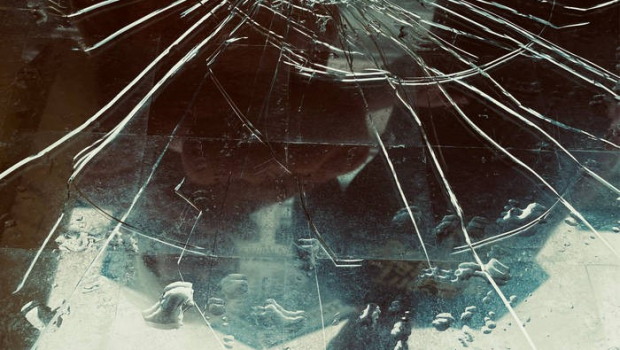The image of the Sony Warehouse after it was torched in 2011’s London Riots is a lasting one; plumes of black cloud are seen billowing out of the roof, while the right-hand side of the building where the large blue-lettered Sony sign was emblazoned is slumped, like a fallen giant.
Around this time, a folk musician from North Carolina MC Taylor, who produces music under the name Hiss Golden Messenger, was about to release his album Bad Debt and his excitement was boundless;
“I was excited, I was mostly excited because Bad Debt was sort of a turning point for me as a songwriter, where I felt like I really started to understand what I could do as a songwriter and also, what I wasn’t as good at and didn’t need to focus so much energy on.
I was excited because, and I am remaining so to this day, about this idea of a very personal collection of songs.”
Devastatingly, it soon emerged that the copies of this album which Taylor identified as such a cornerstone in his career, had been engulfed in the flames and completely destroyed. London record label, Black Maps, were set to release the record and they kept Hiss Golden Messenger abreast of the tumultuous events;
“I was pretty aware of the riots that were happening in London because the guys I was working with worked in London so I was getting pretty frequent updates, and it was just everybody’s bad luck that runs a record label and as a musician whose stuff was in that Sony warehouse, it was bad luck.”
However, Hiss Golden Messenger refused to have his spirits crushed thinking the album, which he recorded far out in the country with only his sleeping new-born son for company, would see the light of day;
“When the riots were going on and the copies of the album were destroyed honestly, like I was upset but I was kind of under the impression that there would be some sort of insurance settlement and that the albums’ would be repressed.”
However these flickers of hope were blown out like candlelight and any hopes of the record being salvaged from the flames were vanquished;
“It wasn’t until several months later when it became clear that the record was not gonna be available that I was kind of bummed out.”
The record label, which the album was tied up with, had virtually been made defunct by the fire and exhausted of the funds to repress the album; to make matters worse any hopes of a settlement were denied to both artist and label;
“Over time I became annoyed with the whole issue of whether there was going to be insurance on it, because it was pretty obvious at the time that larger record labels did actually get a settlement that allowed them to repress their stock and the smaller record labels kind of just lost everything, I mean that record label that I was working with, they essentially shut down. I try not to dwell on it too much; I don’t run a record label, I write songs.”
This left Taylor in limbo, exiled from the future of his own art, with the rights of the record effectively signed over to a record label, who had no plans to release the work;
“Once all those copies were destroyed and the record label said they weren’t gonna repress the record, I was in quite a bit of a quandary with them, so to put it out would have led them to take me to court, which they probably would have done.”
The immensity of this setback for an artist trying to make a break is hard to contemplate, yet instead of resting on his laurels and directing his efforts to get this finished record out, Hiss Golden Messenger showed incredible resolve and moved onto pastures new;
“I didn’t wanna deal with it [Bad Debt] at that point, I didn’t wanna deal with it, I felt like the best thing for me to do then was to continue moving forward and circle back to Bad Debt when I had the emotional resolve to do so and yeah, the other thing was that it was legally tied up with the record label, so to really fight for an alternate route to get it out there would lead ultimately to an acrimonious situation with that record label, which ultimately did happen right, but at the time I was not ready to do that.”
So, MC Taylor, with a record in the hands of a broke label, moved on, making first, Poor Moon, a much grander album than the spare Bad Debt with sixteen guitarists helping to make a hybrid record of folk and country rock. Then, Haw to much acclaim in 2013 which walks the bridge between happiness and sadness, pleading “be happy” in first song Red Nose Nantahala before MC Taylor digs deeper into himself throughout the rest of the record, which ultimately at the time of recording, led him to have to see the doctor about anxiety issues;
“I continued to write and make records after Bad Debt, I made Poor Moon, I made Haw, I made Lord I Love the Rain and I did a bunch of other one off recordings and I was playing a bunch of shows, that’s all in the past three years. I definitely kept myself busy knowing at some point I would need to focus a little energy on Bad Debt because I think it’s an important record for me, so that’s what we did, finally”
Having kept the master recordings himself, Hiss Golden Messenger was now ready to ‘deal with it’ and wrestle the rights of his record back from the hands of London record label, black maps;
“You know, then we had to get lawyers involved and it got a little messy. We made an out of court settlement to put the rights of the record back to me and as I was already working with Paradise of Bachelors [a record label in North Carolina] and I told them, you know what, I think I’m gonna get this Bad Debt record back, would you be interested if I do, and they said yeah.”
After nearly three years of obscurity, Bad Debt was rescued from the flames and born again. It was widely released in January 2014 and for most, hearing it for the first time, it seemed like a new album, and the ‘turning point’ nature of the record was immediately resonant, striking many as Hiss Golden Messenger’s masterpiece, Hiss Golden Messenger’s Forever Emma, Forever Ago.
“It’s funny to me because its lived with me so intensely for so long but I think your right, I think most people are hearing it for the first time, there might be a small section of the listening public who had heard of the record but never heard it.
I am really thinking of it for the purposes of the public as a new record, which is sort of funny.
All the songs continue to be very important to me, so I don’t mind playing them at all, I kind of like it, I like a reason to really think about those songs again”
As the conversation moved on, a real sense of the true magnitude of Bad Debt in terms of Hiss Golden Messenger’s personal and musical development emerged from Taylor;
“At that time my relationship to the music business was much different than it is now, at that time I felt it could have gone either way, like if I were to ever to get out of the music business that would have been the time, so in many ways Bad Debt was hitting the reset button a little bit, either I figure out a way to interact with music that makes me genuinely happy or I get out of this altogether, so that’s why I’m always saying that Dad Debt was the turning point for me because I found a way to make myself happy making music that has zero to do with the commodification of music.”
Hiss Golden Messenger struck this happy medium by making an extremely personal collection of songs; Bad Debt both questions his role as a father and his relationship to faith;
“It was a record that I wrote while I was taking care of my son, my wife was working and I staying home with my new-born son, Elijah, and you know, being that far out there not knowing anybody out there, just being there with a new-born baby, there was a lot of questions that I had for myself about what I was doing.
Faith also appears in my music because its what’s been on my mind and it’s important to note that I’m not necessarily attending church every Sunday, it’s just been important me to use music as a way to decipher what my own relationship to faith is.
It’s a big part of the place I live, which is the American South, and in a lot of ways I feel like religion and faith has been co-opted by corporations and people use faith in a very unchristian way, I think in a way that Jesus Christ would be very upset with, I mean if you really read the gospels people use religion in very sick ways and I am trying to understand my own relationship to spirituality and whether there’s a place for it in my life.”
When I ask if putting so much of your personal life into the public domain is the right thing to do and whether it can lead to fractious familial relations, his response is unequivocal;
“No, not really, I mean I think it’s important for people that are making art to have a deep personal connection to their work, especially when their putting it out there to the public. You know, whether people are asking me questions that are very personal I can choose to answer those or not, I have absolutely no responsibility to give anyone anything more than what’s on that record.
That’s my own personal feeling, If I’m going to bother putting all that effort to put something about me in the world then it damn well better be honest, what’s the point if it’s not honest and then if that brings up some uncomfortable realities, then that’s how it goes, I have no problem with that”
Since the time of Bad Debt, a new born daughter has come into MC Taylor’s life, she was born last Summer, and with a new album due this September, I wondered if this record would represent an aural diary constructed about her entrance in to the world, in the way he had done with Elijah on Bad Debt, and whether the album will continue to question his role as a father;
“There’s a couple of songs that mention her and yeah I mean, my life always feels like it’s in a state of flux for sure, so I feel like a sort of book was opened in my head at the time of Bad Debt that has never been closed, I mean the questions that I’m asking myself on Bad Debt are still the same ones I’m grappling with on this new record that we’ve just made.
The questions are like, what am I doing with my life? What is my relationship with faith? Is there a place in this world that can make me happy? Erm, you know how does my life and my priorities need to change being a father, when I feel I don’t understand myself, let alone two small children, so then, you know, it becomes a question about whether everyone else in the world is faking it in the way I am.”
This record is set for steady waters in its journey into the world, compared to the relentless crashing waves Bad Debt faced at every corner, but now years later with Bad Debt in our hands, it’s hard not to think that this tantalising tale has only served to further its mythical qualities.
Hiss Golden Messenger’s thoughts on the album’s fate are endowed with his take-it-in-his-stride resolve and his incredible propulsion to always to be able to look forward;
“I can’t say that it’s not been a pretty tumultuous journey for this particular record, but I can’t say I would necessary do anything different now, I really like the way it’s come out now, it’s just life, you know.”
Hiss Golden Messenger plays at the Soup Kitchen on May 18th
Home page photo by Harlan Campbell
Hiss Golden Messenger Official | Facebook | Soundcloud



















